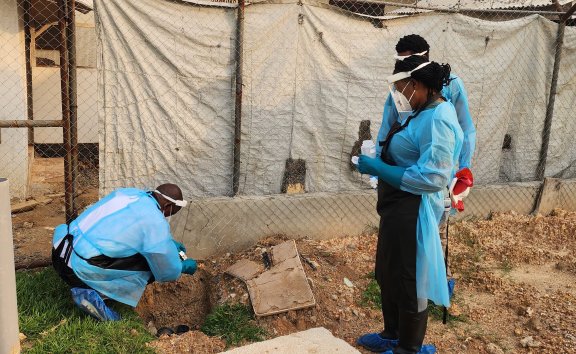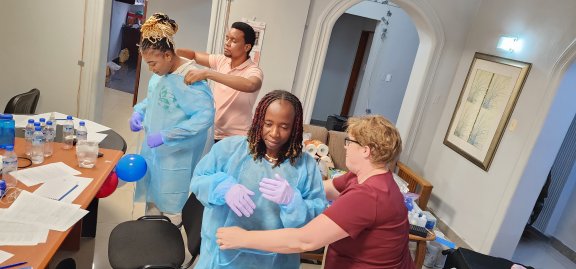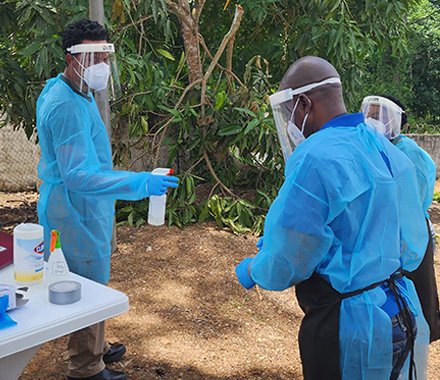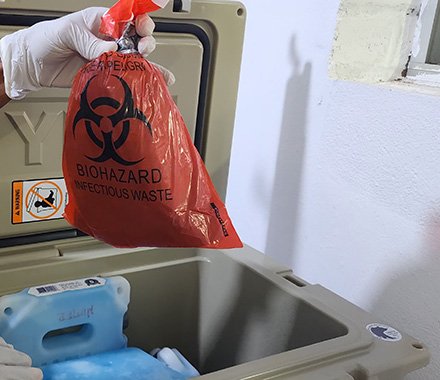
The recent COVID-19 experience is a demonstration of how disastrous public health emergencies can be if health systems are caught unaware and ill-prepared. Preparedness involves measures undertaken in advance to better respond and cope with emergencies such as early detection of health threats and emergencies which inform public health measures and limit disease spread.
In Liberia, STOP Spillover is supporting the government and its partners to establish and validate protocols for detecting Lassa virus Ribonucleic acid (RNA) and its surrogates in highly contaminated environments to improve early detection and surveillance of the deadly haemorrhagic disease. Previous efforts of Lassa fever surveillance in the country have been limited to serosurveillance and syndromic surveillance of patients in health facilities (Fichet-Calvet, 2014; Grant et al. 2023, Rohan et al. 2022). Moreover, research shows that Lassa survives for 1-2 days in water and wastewater and can be inactivated by chlorine.
In April 2024, the STOP Spillover Liberia Country Team launched a pioneering wastewater surveillance initiative at Liberia's Phebe Hospital in Bong County and Liberia Agriculture Company (LAC) Hospital in Grand Bassa County. Phebe and LAC Hospitals were purposively selected because of their specialized Lassa isolation wards and pivotal role in managing suspected and confirmed Lassa cases in the country. The wastewater surveillance initiative is expected to take 12 weeks, with sampling taking place twice a week.

The wastewater sampling initiative began with the training of the sampling team on the safe collection of effluent samples and the organization of necessary sampling tools and equipment. The team comprised STOP Spillover Liberia Country Team members, four research technicians, and two partners from the National Public Health Institute of Liberia and the Liberia Water and Sewerage Corporation. The one-day comprehensive training session was delivered by Tufts University Professor Daniele Lantagne, a wastewater specialist. Following the training, STOP Spillover delivered equipment and lab consumables to the National Reference Lab (NRL) to facilitate sample testing.
The first sampling exercise took place the week of 15 April 2024, with three samples collected and shipped to the NRL. Passive sampling in pipes carrying wastewater from Lassa isolation wards was done by the sampling team. The team placed cotton plugs (passive sampler) in the pipe carrying wastewater from the isolation ward through access points for four to six hours before collecting it. The sample was then packaged and shipped to NRL for extraction and testing.


Engaging directly with hospital administrations was key to the project kick off and the success of the first field exercise. Dr. Minnie Sankawulo-Ricks, the Medical Director of Phebe Hospital, expressed enthusiasm and support for this groundbreaking research venture. “I am grateful that you selected Phebe Hospital for such worthy research activity. I can assure you of my commitment and the entire Phebe Hospital commitment and we look forward to the outcome of this research to strengthen our own surveillance system here at Phebe Hospital because we are in a Lassa endemic county,” said Dr. Sankawulo-Ricks.
According to Alex Mulbah, the STOP Spillover activity lead, the sampling was interrupted following a delay in testing the first samples due to an inadequate supply of Amicon tubes. “The tubes have been procured and are currently being shipped into the country. As soon as they are delivered, we shall resume the activity. Once the protocols are validated, they will serve as an early warning surveillance system for Lassa virus in Liberia,” said Mulbah.